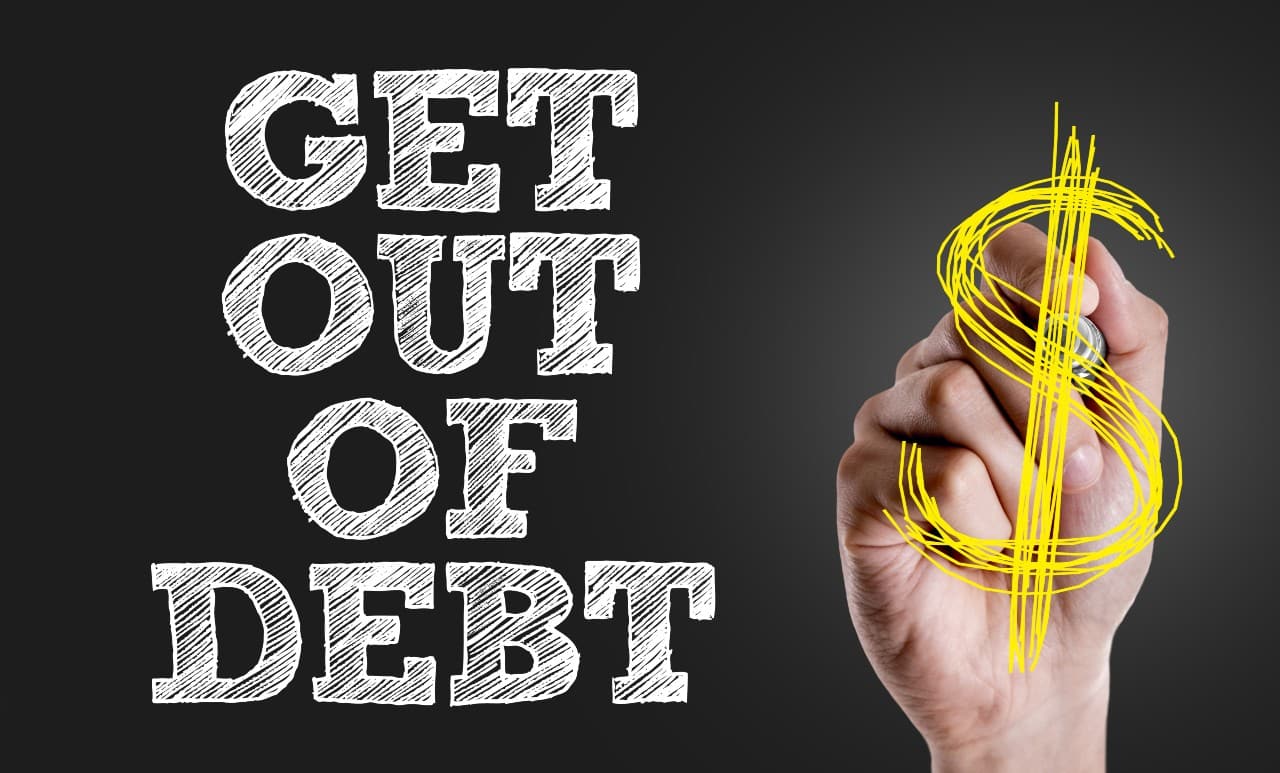What is a debt management program?
A debt management program (DMP), is an effective method for dealing with unmanageable unsecured debt, like credit cards. These debts often have high interest rates attached. The debt management plan works by reducing (or even eliminating) this interest. It also simplifies repayment by combining all your debt payments into a single monthly payment. Administrators distribute this payment among your creditors.
It is a voluntary agreement between you and your creditors, facilitated by a credit counselling agency. As a first step, the agency reviews your financial situation to check whether this option is well-suited for you.
How does a debt management program work?
A debt management plan combines all your unsecured credit balances into one repayment schedule. Unlike a debt consolidation loan, the money is still owed to your original creditors, and you still need to pay back the full amount you borrowed.
The first step is to talk to a non-profit credit counselling agency. Reputed agencies should ideally provide a free consultation and budget evaluation to understand your financial situation. Once they have a better idea of your finances, they will suggest the best approach for your specific situation. Some other viable options may be debt consolidation, debt settlement, and consumer proposals.
What are the different kinds of debt?
There are two main types of consumer debt: secured, and unsecured. Secured debt is attached to collateral, like a mortgage which is attached to your home. Unsecured debt, on the other hand, does not have associated security or assets, for example, credit card debt.
Debt management programs allow you to get ahead of your debt payments, especially if the bulk of your dues are for high-interest unsecured debt.
What debts can I include in a debt management program?
Debt management programs focus on helping you pay off high-interest, unsecured debt. This means that you could include credit cards, charge cards, store credit cards, lines of credit, personal loans, and more! Most credit counselling agencies already have established relationships with lenders and retailers, so they are able to work out arrangements on your behalf. You may also be able to add in debt consolidation loans, gas cards, store credit lines, and more.
Note that these plans cannot include secured debt, like mortgages, HELOCs, or auto loans. Student loans are also not eligible for inclusion in a DMP.
Is a debt management plan safe?
A debt management plan is a safe bet if you’re looking to avoid late payments and are unable to keep up with your bills, but it is subject to approval from your creditors. Keep in mind that it is limited to unsecured debt, like credit cards. Also, you may need to close some (or all) of your credit accounts, and may not be able to apply to open more.
What are the advantages of a debt management plan?
One of the strongest advantages of a debt management plan is the reduction, or even elimination, of interest. You are likely to get a great reduction in your interest, so you’ll end up paying much less interest overall, and your monthly payments could be reduced by up to 50 percent. Plus, you only have one payment to make instead of handling multiple bills.
With a debt management plan, you are able to pay back the full amount you owe, which brings a great sense of relief. Compared to other debt solutions, this may even have a lesser impact on your credit score overall, though you will get an R7 notation on your credit report. You can use a DMP for high amounts of debt as well.
What are the disadvantages of a debt management plan?
A debt management plan may take longer to pay off, and you will have to pay the full amount owed. This means you may have to pay more than you do with other debt solutions, like debt settlement. Any credit accounts that you include in your debt management plan will have to be closed. Also, you may not be able to open more accounts while the process is ongoing. A notation will likely be temporarily added to your credit report, which may mean a lower credit score and difficulties in getting new unsecured credit.
Is it worth doing a debt management plan?
Debt management plans can help you get a handle on your finances if you’re starting to struggle with payments. Make sure you check the certifications, credentials, and accreditations of the counselling agency before you sign up. A DMP cuts down all your bills to just one single payment, and the agency handles payments and interactions with creditors and collections. Just the benefit of not having to respond to repeated calls from lenders is worth it to many.
Before opting for a debt management plan, check the other options available to you, like debt consolidation or a consumer proposal. It’s best to see if they fit your finances better.
How effective is a debt management plan?
A debt management plan can be an effective way to pay off your debts. The credit counselling agency you work with will be able to prepare a payment plan, and even create a budget for you. The payment plan will have information on monthly bill amounts, and when you will be able to pay everything off if you stick to the schedule, which can be motivating information for many.
As a bonus, if you follow their budgeting advice, you will be able to make consistent payments and pay off your debts effectively, building good financial habits long term.
Is a debt management plan a good fit?
A debt management plan is a good fit for those able to manage the monthly payments. While a DMP can reduce your monthly payments by up to 50%, you still need to make timely payments to chip away at your debt.
A DMP is also a good fit for you if you would prefer not to deal with creditors or collections calls yourself, since the agency will do this for you. It will also reduce your bills to one single monthly payment since the agency takes on the responsibility of paying your creditors on your behalf.
Is debt management bad for your credit?
Debt management plans can add an R7 rating and notation to your credit report. This notation stays for around 2-3 years after you finish making your payments. An R7 notation is still less severe than other options like bankruptcy, which adds an R9 notation.
What kind of effect a DMP has on your credit score will depend on many factors, like your credit history, track record of timely payments, and whether you have any other negative notations on your file already.
How long does a debt management plan stay on credit file?
A debt management plan will show up on your credit report as an R7 rating. This note will stay for around 3 years after you complete the program, or 6 years from the first filing date, whichever is lesser. Since a DMP often greatly reduces your credit card’s APR (interest rate). It is an adjusted repayment plan, which is what the rating signifies.
How can I fix my credit after a debt management plan?
After a debt management plan, your score should start to rebuild over time as you continue making payments on your existing credit accounts, if any. Any credit accounts included in the DMP are required to be closed. If you already have more existing accounts after program completion, make payments in full. You should ideally have a low credit utilization ratio, which will reflect positively on your credit score.
It is also advisable to check your credit report regularly, at least at the beginning of the credit rebuilding process, so you can dispute errors and keep track of how your score is progressing. If you had closed all your credit accounts during the DMP, you may want to look into getting a secured credit card to rebuild credit.
Can I get a credit card while on a debt management plan?
Unfortunately, you cannot apply for new credit cards or lines of credit while enrolled in a debt management plan. You can still apply for secured credit, like a mortgage, or get a secured credit card.
A secured credit card is attached to a cash collateral. This allows the lender access to funds in the case of a missed payment. This approach can also help you rebuild your credit score over time by making timely, regular payments.
Does a debt management plan affect your mortgage?
A debt management plan will not affect your existing mortgage. There will be no change in your terms and conditions or payment schedule. In fact, you may find it easier to afford monthly mortgage payments, since your overall debt payments would have reduced.
Can you get a mortgage if you’re on a debt management plan?
You can still apply for a mortgage if you’re on a debt management plan. Note that mortgage lenders will see an R7 rating on your credit report. There may also be a negative impact on your credit score. This does not mean being declined is a certainty. It just means that lenders will take a closer look at your finances before they make a decision. They may also choose to offer you a mortgage loan, but for a lower amount, or at a higher rate of interest.
What happens if you want to leave the program?
You can leave a debt management program at any point since it is a voluntary arrangement with your creditors. It’s not a legally binding program. You are not bound to complete a DMP if your circumstances change or if you wish to make your repayments in a different way.
Is debt management the same as debt settlement?
No, debt management is not the same as debt settlement. With a DMP, you pay back the full principal amount that you owe. With a debt settlement, you only pay back a portion of the debt. However, because debt settlement plans require only repaying a portion of the money owed it can have a worse effect on your credit report. They are likely to wrap up quicker than a DMP.
What are the benefits of a debt management plan vs a consumer proposal?
With a debt management plan, you pay back the entire principal amount that you owe. With a consumer proposal, you pay back only a portion. A DMP is also likely to wrap up quicker than a consumer proposal. This means it can also drop off your credit report quicker.
In addition, a debt management plan is entirely voluntary. You can opt out at any time, which is not the case with a legally binding consumer proposal. Lastly, a consumer proposal becomes a matter of public record, which is not the case with a debt management program. Consider these factors when deciding which one is a better fit for you.



